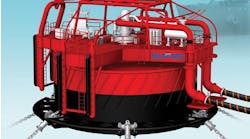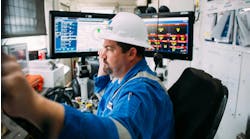EXMAR extends offshore use of potable water test kit
Offshore staff
ANTWERP, Belgium – EXMAR Ship Management will use the LuminUltra Quench-Gone Aqueous (QGA) test kit to monitor drinking water produced onboard the LPG FSO NKOSSA II.
This follows successful deployments over the past four years on two EXMAR Offshore Services accommodation vessels, the 450-POB bargeNunce and the 300- POB Wariboko.
Paul-Philippe Halleux, technical superintendent at EXMAR Ship Management’s Offshore Services division, said: “We produce drinking water through reverse osmosis and with some of our accommodation barges operating offshore Africa we do not have the time to wait for onshore laboratories to test the samples…
“Even though regulations require bacterial testing only twice a year, we prefer to carry out water quality tests every week.”
Using the portable test kit onboard, he added, results are available within minutes, “so we know immediately if the water is fit for human consumption.”
The FSONKOSSA II will be equipped with the kit later this month and EXMAR is considering extending its use aboard LNG and LPG vessels.
A single analysis based on the measurement of Adenosine Triphosphate, QGA is said to provide a fast, interference-free determination of the total microbiological concentration in any filterable water sample with a wide detection range.
The kit is designed for testing from many points in a water generation system to detect elevated microbial growth levels in real time. Results are available within five minutes.
Anna Whittaker, LuminUltra Technologies Regional Sales Manager – Europe, said: “Drinking water standards are heavily regulated by the World Health Organization, and in 2006, the Maritime Labour Convention introduced guidelines [Standard A3.2] aimed at maintaining the quality of drinking water onboard ships. In the case of accommodation barges, SOLAS recommends that drinking water is tested for bacteria just twice a year, although other tests are more frequent.”
02/18/2019



